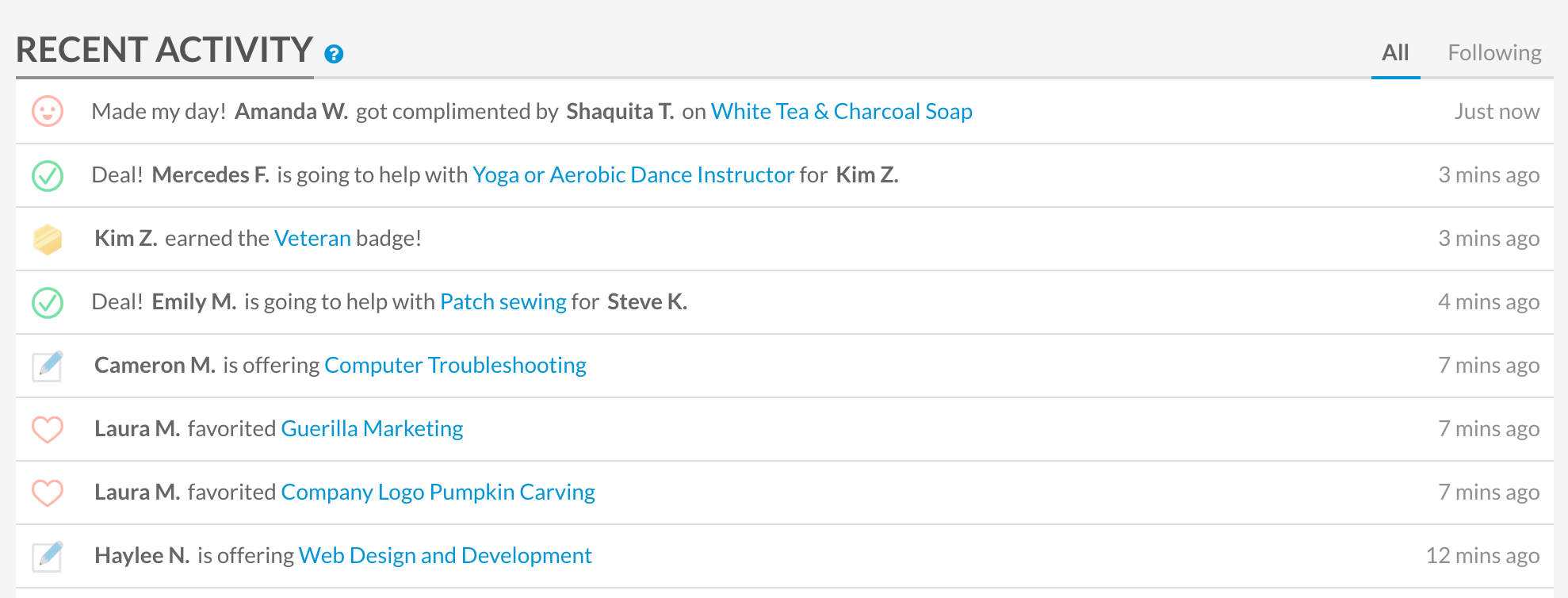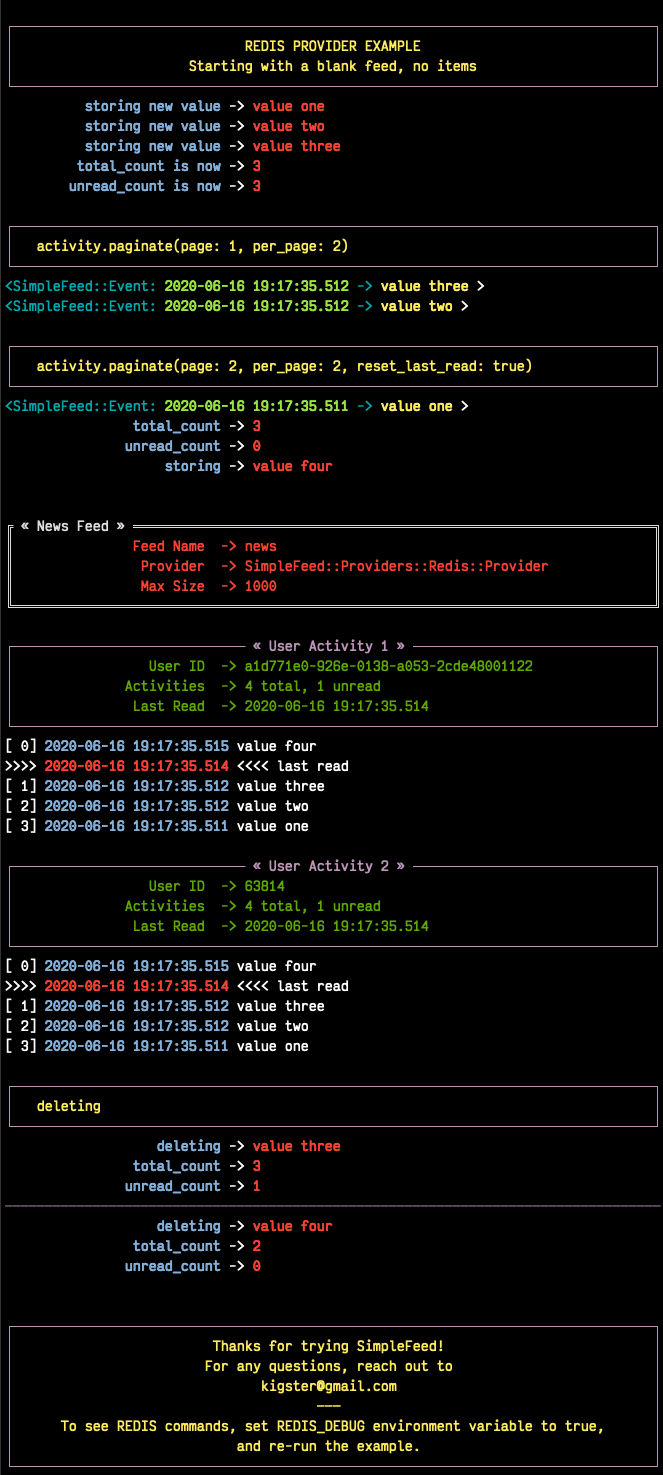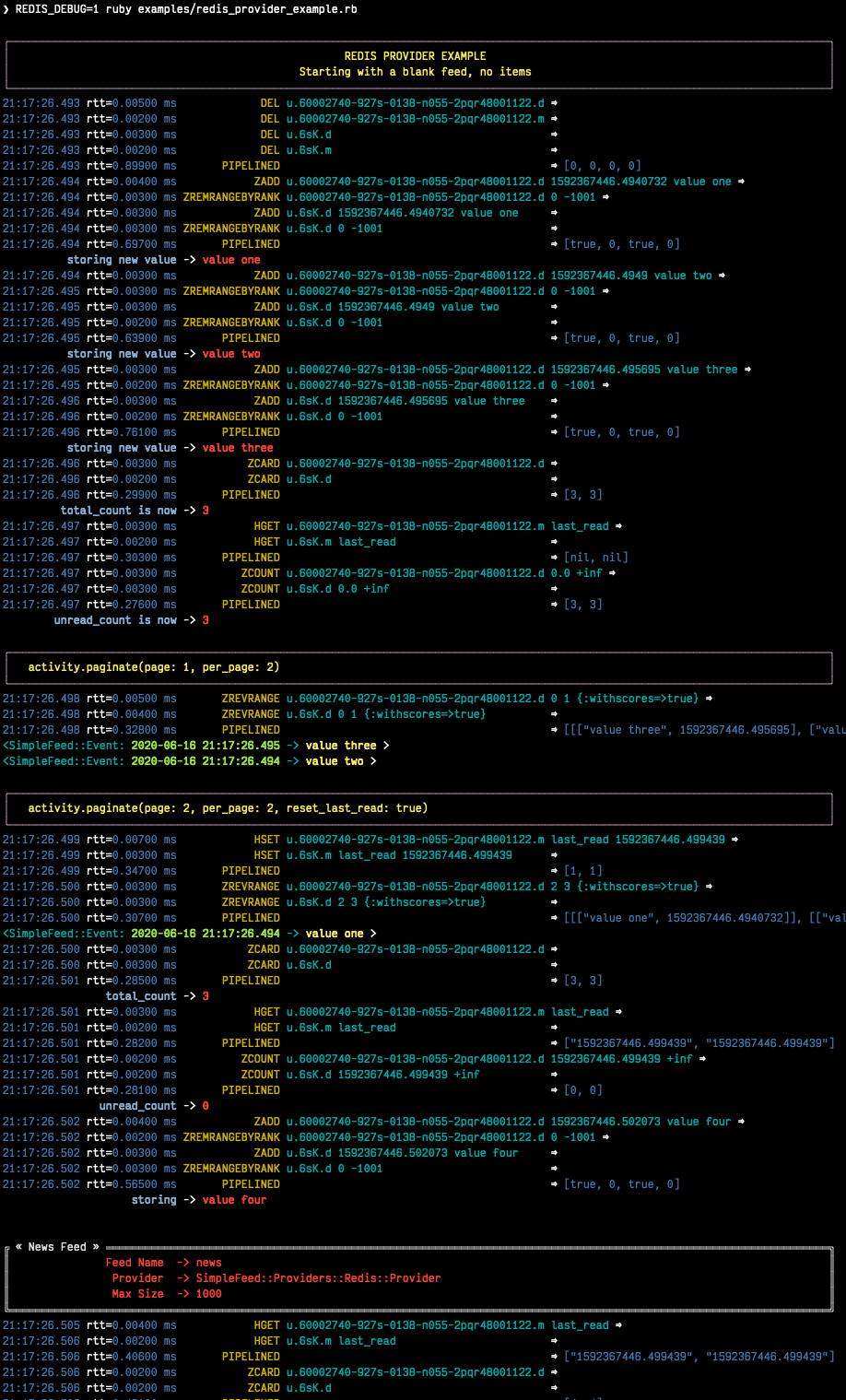SimpleFeed — Scalable, easy to use activity feed implementation.
This is a fast, pure-ruby implementation of an activity feed concept commonly used in social networking applications. The implementation is optimized for read-time performance and high concurrency (lots of users), and can be extended with custom backend providers. Two providers come bundled: the production-ready Redis provider, and a naive pure Hash-based provider.
Important Notes and Acknowledgements:
- SimpleFeed does not depend on Ruby on Rails and is a pure-ruby implementation.
- SimpleFeed requires ruby 2.3 or later.
- SimpleFeed is currently live in production.
- We'd like to thank Simbi, Inc — Symbiotic Economy for their sponsorship of the development of this open source library.
What is an activity feed?
Activity feed is a visual representation of a time-ordered, reverse chronological list of events which can be:
- personalized for a given user or a group, or global
- aggregated across several actors for a similar event type, eg. "John, Mary, etc.. followed George"
- filtered by a certain characteristic, such as:
- the actor producing an event — i.e. people you follow on a social network, or "yourself" for your own activity
- the type of an event (i.e. posts, likes, comments, stories, etc)
- the target of an event (commonly a user, but can also be a thing you are interested in, e.g. a github repo you are watching)
Here is an example of a real feed powered by this library, and which is very common on today's social media sites:
What you publish into your feed — i.e. stories or events, will depend entirely on your application. SimpleFeed should be able to power the most demanding write-time feeds.
Challenges
Building a personalized activity feeds tend to be a challenging task, due to the diversity of event types that it often includes, the personalization requirement, and the need for it to often scale to very large numbers of concurrent users. Therefore common implementations tend to focus on either:
- optimizing the read time performance by pre-computing the feed for each user ahead of time
- OR optimizing the various ranking algorithms by computing the feed at read time, with complex forms of caching addressing the performance requirements.
The first type of feed is much simpler to implement on a large scale (up to a point), and it scales well if the data is stored in a light-weight in-memory storage such as Redis. This is exactly the approach this library takes.
For more information about various types of feed, and the typical architectures that power them — please read "How would you go about building an activity feed like Facebook?" by Lee Byron.
Overview
The feed library aims to address the following goals:
- To define a minimalistic API for a typical event-based simple feed, without tying it to any concrete provider implementation
- To make it easy to implement and plug in a new type of provider, eg.using Couchbase or MongoDB
- To provide a scalable default provider implementation using Redis, which can support millions of users via sharding
- To support multiple simple feeds within the same application, but used for different purposes, eg. simple feed of my followers, versus simple feed of my own actions.
Usage
First you need to configure the Feed with a valid provider implementation and a name.
Configuration
Below we configure a feed called :newsfeed, which presumably
will be populated with the events coming from the followers.
require 'simplefeed'
require 'simplefeed/providers/redis'
# Let's define a Redis-based feed, and wrap Redis in a in a ConnectionPool.
SimpleFeed.define(:newsfeed) do |f|
f.provider = SimpleFeed.provider(:redis,
redis: -> { ::Redis.new },
pool_size: 10)
f.per_page = 50
f.batch_size = 10 # default batch size
f.namespace = 'nf'
end
After the feed is defined, the gem creates a similarly named method
under the SimpleFeed namespace to access the feed. For example, given
a name such as :newsfeed the following are all valid ways of
accessing the feed:
SimpleFeed.newsfeedSimpleFeed.get(:newsfeed)
You can also get a full list of currently defined feeds with SimpleFeed.feed_names method.
Reading from and writing to the feed
For the impatient here is a quick way to get started with the
SimpleFeed.
activity = SimpleFeed.get(:followers).activity(@current_user.id)
# Store directly the value and the optional time stamp
activity.store(value: 'hello')
# => true
# or equivalent:
@event = SimpleFeed::Event.new(value: 'hello', at: Time.now)
# or even simpler:
@event = SimpleFeed::Event.new('hello', Time.now)
# and then:
activity.store(event: @event)
# => false # false indicates that the same event is already in the feed.
As we've added events for this user, we can request them back, sorted by
the time and paginated. If you are using a distributed provider, such as
Redis, the events can be retrieved by any ruby process in your
application, not just the one that published the event (which is the
case for the "toy" Hash::Provider.
activity.paginate(page: 1)
# => [ <SimpleFeed::Event#0x2134afa value='hello' at='2016-11-20 23:32:56 -0800'> ]
The Two Forms of the API
The feed API is offered in a single-user and a batch (multi-user) forms.
The main and only difference is in what the methods return. In the
single user case, the return of, say, #total_count is an Integer
value representing the total count for this user.
In the multi-user case, the return is a SimpleFeed::Response instance,
that can be thought of as a Hash, that has the user IDs as the keys,
and return results for each user as a value.
Please see further below the details about the Batch API.
Single-User API
In the examples below we show responses based on a single-user usage. As previously mentioned, the multi-user case is the same, except for the response values, and is discussed further below.
Below is a user session that demonstrates simple return values from the feed operations for a given user:
require 'simplefeed'
# Define the feed using an in-memory Hash provider, which uses
# SortedSet to keep user's events sorted.
SimpleFeed.define(:followers) do |f|
f.provider = SimpleFeed.provider(:hash)
f.per_page = 50
f.per_page = 2
end
# Let's get the Activity instance that wraps this user_id
activity = SimpleFeed.get(:followers).activity(user_id) # => [... complex object removed for brevity ]
# let's clear out this feed to ensure it's empty
activity.wipe # => true
# Let's verify that the counts for this feed are at zero
activity.total_count # => 0
activity.unread_count # => 0
# Store some events
activity.store(value: 'hello') # => true
activity.store(value: 'goodbye') # => true
activity.unread_count # => 2
# Now we can paginate the events, which by default resets "last_read" timestamp the user
activity.paginate(page: 1)
# [
# [0] #<SimpleFeed::Event#70138821650220 {"value":"goodbye","at":1480475294.0579991}>,
# [1] #<SimpleFeed::Event#70138821649420 {"value":"hello","at":1480475294.057138}>
# ]
# Now the unread_count should return 0 since the user just "viewed" the feed.
activity.unread_count # => 0
activity.delete(value: 'hello') # => true
activity.total_count # => 1
You can fetch all items in the feed using #fetch, and you can
#paginate without resetting the last_read timestamp by passing the
peek: true as a parameter.
Batch (Multi-User) API
This API should be used when dealing with an array of users (or, in the future, a Proc or an ActiveRecord relation).
There are several reasons why this API should be preferred for operations that perform a similar action across a range of users: various provider implementations can be heavily optimized for concurrency, and performance.
The Redis Provider, for example, uses a notion of
pipeliningto send updates for different users asynchronously and concurrently.
Multi-user operations return a SimpleFeed::Response object, which can
be used as a hash (keyed on user_id) to fetch the result of a given
user.
# Using the Feed API with, eg #find_in_batches
@event_producer.followers.find_in_batches do |group|
# Convert a group to the array of IDs and get ready to store
activity = SimpleFeed.get(:followers).activity(group.map(&:id))
activity.store(value: "#{@event_producer.name} liked an article")
# => [Response] { user_id1 => [Boolean], user_id2 => [Boolean]... }
# true if the value was stored, false if it wasn't.
end
DSL
The library offers a convenient DSL for adding feed functionality into your current scope.
To use the module, just include SimpleFeed::DSL where needed, which
exports just one primary method `with_activity'. You call this method
and pass an activity object created for a set of users (or a single
user), like so:
require 'simplefeed/dsl'
include SimpleFeed::DSL
feed = SimpleFeed.newsfeed
activity = feed.activity(current_user.id)
data_to_store = %w(France Germany England)
def report(value)
puts value
end
with_activity(activity, countries: data_to_store) do
# we can use countries as a variable because it was passed above in **opts
countries.each do |country|
# we can call #store without a receiver because the block is passed to
# instance_eval
store(value: country) { |result| report(result ? 'success' : 'failure') }
# we can call #report inside the proc because it is evaluated in the
# outside context of the #with_activity
# now let's print a color ASCII dump of the entire feed for this user:
color_dump
end
printf "Activity counts are: %d unread of %d total\n", unread_count, total_count
end
Complete API
For completeness sake we'll show the multi-user API responses only. For a single-user use-case the response is typically a scalar, and the input is a singular user_id, not an array of ids.
Multi-User (Batch) API
Each API call at this level expects an array of user IDs, therefore the
return value is an object, SimpleFeed::Response, containing individual
responses for each user, accessible via response[user_id] method.
@multi = SimpleFeed.get(:feed_name).activity(User.active.map(&:id))
@multi.store(value:, at:)
@multi.store(event:)
# => [Response] { user_id => [Boolean], ... } true if the value was stored, false if it wasn't.
@multi.delete(value:, at:)
@multi.delete(event:)
# => [Response] { user_id => [Boolean], ... } true if the value was removed, false if it didn't exist
@multi.delete_if do |user_id, event|
# if the block returns true, the event is deleted
end
# Wipe the feed for a given user(s)
@multi.wipe
# => [Response] { user_id => [Boolean], ... } true if user activity was found and deleted, false otherwise
# Return a paginated list of all items, optionally with the total count of items
@multi.paginate(page:, per_page:, peek: false, with_total: false)
# => [Response] { user_id => [Array]<Event>, ... }
# Options:
# peek: true — does not reset last_read, otherwise it does.
# with_total: true — returns a hash for each user_id:
# => [Response] { user_id => { events: Array<Event>, total_count: 3 }, ... }
# Return un-paginated list of all items, optionally filtered
@multi.fetch(since: nil)
# => [Response] { user_id => [Array]<Event>, ... }
# Options:
# since: <timestamp> — if provided, returns all items posted since then
# since: :unread — if provided, returns all unread items and resets +last_read+
@multi.reset_last_read
# => [Response] { user_id => [Time] last_read, ... }
@multi.total_count
# => [Response] { user_id => [Integer] total_count, ... }
@multi.unread_count
# => [Response] { user_id => [Integer] unread_count, ... }
@multi.last_read
# => [Response] { user_id => [Time] last_read, ... }
Providers
A provider is an underlying implementation that persists the events for each user, together with some meta-data for each feed.
It is the intention of this gem that:
- it should be easy to swap providers
- it should be easy to add new providers
Each provider must implement exactly the public API of a provider shown
above (the Feed version, that receives user_ids: as arguments).
Two providers are available with this gem:
SimpleFeed::Providers::Redis::Provideris the production-ready provider that uses the sorted set Redis data type and their operations operations to store the events, scored by their time typically (but not necessarily). This provider is highly optimized for massive writes and can be sharded by using a Twemproxy backend, and many small Redis shards.SimpleFeed::Providers::HashProvideris a pure Hash-like implementation of a provider that can be useful in unit tests of a host application. This provider could be used to write and read events within a single ruby process, can be serialized to and from a YAML file, and is therefore intended primarily for Feed emulations in automated tests.
Redis Provider
If you set environment variable REDIS_DEBUG to true and run the example (see below) you will see every operation redis performs. This could be useful in debugging an issue or submitting a bug report.
Running the Examples
Source code for the gem contains the examples folder with an example file that can be used to test out the providers, and see what they do under the hood.
To run it, checkout the source of the library, and then:
git clone https://github.com/kigster/simple-feed.git
cd simple-feed
bundle
be rspec # make sure tests are passing
ruby examples/redis_provider_example.rb
The above command will help you download, setup all dependencies, and run the examples for a single user:
If you set REDIS_DEBUG variable prior to running the example, you will be able to see every single Redis command executed as the example works its way through. Below is a sample output:
Generating Ruby API Documentation
rake doc
This should use Yard to generate the documentation, and open your browser once it's finished.
Installation
Add this line to your application's Gemfile:
gem 'simple-feed'
And then execute:
$ bundle
Or install it yourself as:
$ gem install simple-feed
Development
After checking out the repo, run bin/setup to install dependencies. Then, run rake spec to run the tests. You can also run bin/console for an interactive prompt that will allow you to experiment.
To install this gem onto your local machine, run bundle exec rake install. To release a new version, update the version number in version.rb, and then run bundle exec rake release, which will create a git tag for the version, push git commits and tags, and push the .gem file to rubygems.org.
Contributing
Bug reports and pull requests are welcome on GitHub at https://github.com/kigster/simple-feed
License
The gem is available as open source under the terms of the MIT License.
Acknowledgements
- This project is conceived and sponsored by Simbi, Inc..
- Author's personal experience at Wanelo, Inc. has served as an inspiration.



